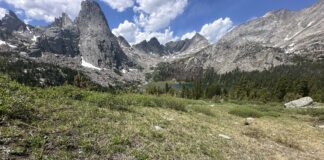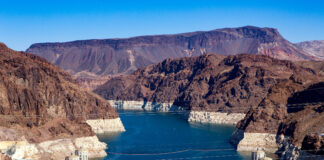
DENVER — Colorado lawmakers are advancing a bill aimed at outlawing water investment speculation, even as they acknowledged their attempt to address the complex problem is an imperfect one.
On Wednesday, members of Colorado’s Water Resources Review Committee voted to put forth a bill in the 2022 legislative session that aims to prohibit a buyer of agricultural water rights from profiting on the increased value of the water in a future sale. The measure is an attempt to prevent out-of-state investors from making a profit off a public resource that grows scarcer in a water-short future driven by climate change.
The draft bill gives the state engineer at the Department of Water Resources the ability to investigate complaints of investment water speculation and fine a purchaser up to $10,000 if they determine speculation is occurring. Those making a complaint could also be fined up to $1,000 if state officials deem a complaint frivolous. A second section of the bill also directs the board of directors of mutual ditch companies to set a minimum percent of agricultural water rights for one purchaser to hold that would trigger the presumption that they are engaging in investment water speculation.
Western Slope state Sens. Kerry Donovan, D-Eagle County, Don Coram, R-Montrose County, and Rep. Karen McCormick, D-Boulder County, are sponsoring the bill.
At the beginning of Wednesday’s discussion, Donovan vented her frustration with what she called mixed messages from water managers. Most seem to agree that stopping investment water speculation is important, but no one can agree on the best way to do that.
“There was a general agreement that investment water speculation was an important issue to work on, so much so… that we invested taxpayer dollars in order to turn out a report,” she said. “We have put resources into addressing this issue and now the feedback is ‘don’t do anything, slow down.’”
Donovan was referring to a report released in August by a work group, which was tasked with exploring ways to strengthen the state’s current anti-speculation laws. The group, made up of water managers and policy experts from across water sectors, came up with a list of concepts on how to prevent water investment speculation. But they did not give clear recommendations to legislators because they could not come to a consensus on which concepts to implement.
Legislators are now saddled with the complex task of figuring out how to protect Colorado’s water from profit-seeking investors without infringing on private property rights.
The lack of consensus points to the varied, sometimes opposing, interests of the work group members. Some municipal water providers may want to see tighter regulations on investment water speculation because as the state continues to urbanize and water moves from agriculture to growing cities, they see speculators as middlemen who have the potential to drive up prices. And although some agricultural water rights owners recognize there could be negative impacts to their communities if water is sold to investors, they also don’t want the state making the process of selling their ranch harder, placing restrictions on who they can sell to or limiting their ability to make a profit.

Bill opposition
District 58 Rep. Marc Catlin, a Montrose County Republican who also serves on the board of the Colorado River Water Conservation District, voted against advancing the bill, which he said still needs more work. He told the committee they need to be sensitive to the concerns of the people the bill is trying to protect.
“I don’t like speculation, but one of the things we’ve got to think about is the people that are selling,” he told Aspen Journalism after the committee meeting. “If you can’t make money, you can’t make a living.”
Although the organization doesn’t take a formal position on legislation until it’s introduced in the next session, which starts Jan. 12, 2022, the Colorado Farm Bureau also has concerns about the bill and submitted comments to the committee. The organization’s comment letter urges the committee to slow the conversation down and not approve the proposal.
Molina rancher Carlyle Currier is the president of the farm bureau and has a seat on the Colorado Basin Roundtable. He said changing Colorado’s already-strong anti-speculation laws could do more harm than good and lead to unintended consequences for agricultural producers. He added that it was troubling that the committee advanced a bill even though the task force did not recommend any changes to policy.
“To set up a task force and ask them for recommendations and then to basically ignore their work because they didn’t like the results of what the task force came up with is, to me, a little troubling,” Currier said.

Speculation conversation
Speculation has been a hot topic of discussion on the Western Slope recently, especially in the Grand Valley, where a New York City-based private-equity firm has been acquiring irrigated farmland. Water Asset Management is now the largest landowner in the Grand Valley Water Users Association, which provides water for farmers in the valley. But under Colorado water law, as long as WAM keeps putting the water to “beneficial use” by keeping the land in agricultural production — which it appears to be doing — it doesn’t count as speculation.
For all the talk about water investment speculation, there is little evidence it’s happening on a large scale on the Western Slope. In some ways, the effort at trying to stop speculation is really a conversation about a broader fear: the loss of agricultural land and with it, a way of life and a part of Colorado’s history, culture and identity. The work group identified the large-scale, permanent dry-up of agricultural lands as the No. 1 risk from speculators.
“Every other week I get a story of someone whose land just got bought up and they are no longer growing hay, they are no longer running cattle,” Donovan told the committee.
But land changing hands or even changing water use from agriculture to cities — as long as it’s done with the approval of the water court — is not the same as investment water speculation.
“There are some outsiders buying, but they haven’t changed the use of those farms, so we can’t really say, ‘what are you doing?’” Catlin said. “We’ve got to be careful to not run from shadows.”
The committee voted 8-2 to advance the bill as a way to keep working on solutions. Sen. Jeff Bridges, a Democrat who represents District 26 in Arapahoe County, said legislators could always kill the bill if they can’t make it work in the next session.
“I’m inclined today to say yes to this and immediately get to work,” he said. “I think we should move forward today with some kind of vehicle to continue this conversation.”
This story ran in the Oct. 30 edition of The Aspen Times, the Oct. 31 edition of the Vail Daily and the Nov. 1 edition of the Summit Daily News.
The Water Desk’s mission is to increase the volume, depth and power of journalism connected to Western water issues. We’re an initiative of the Center for Environmental Journalism at the University of Colorado Boulder. The Water Desk launched in April 2019 with support from the Walton Family Foundation. We maintain a strict editorial firewall between our funders and our journalism.





